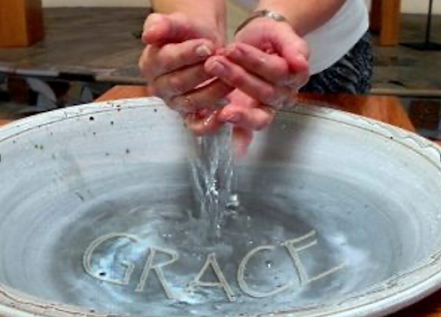Face to Face
During lockdown I rather enjoyed watching church services online while lounging in my bathrobe, sipping coffee, Being something of a spiritual butterfly, If something failed to hold my interest, I could surf the web in search of better music or something slicker and more engaging. In other words, it was governed by mood or emotional engagement, not by any semblance of discipline or responsibility. Which was fun. For a time. But, the sheer volume of the religious smorgasbord on offer was itself an invitation to laziness.
In the U.K, church attendance averages less than 6% of the population. The late poet R. S. Thomas, a priest in the Church of Wales, called himself “a vicar of large things in a small parish.” Yet, a quarter of British adults watched or listened to a religious service during the coronavirus lockdown, and one in twenty started praying during that crisis.
I’ve had a checkered history with the church. From low Anglicanism to Pentecostalism as it perfused into the mainstream, communities and the disasters that flowed therefrom, Anglo-Catholicism, seesawing between hedonistic agnosticism and outright rebellion - the whole horseshoe. Sometimes authoritarian, sometimes straitjacketed into a set of belief systems imposed by others who should have known better, sometimes wandering, visionless, tripping over the tree roots in the twilight. Sometimes, sitting in the ashes and sometimes, sublime.
These days I ask myself why I have returned to the rented halls - one filled with mostly African Brits at university, the other populated by a faithful remnant of Bulgarian speakers. I don’t speak a word of the language.
The most important reason is worship. The weekly gatherings underscore my creaturely status, one in need of a higher moral authority. As great souls such as Martin Luther King Jr., the dissident Czech playwright Václav Havel, and Simone Weil the mystic and visionary have reminded us, what we believe about a Creator can largely determine how we treat fellow human beings—especially the marginalised - and our planet - over which we have a duty of custodial care.
If I want to grow in love and grace, the way to do it is not by attending more Bible studies or prayer meetings; it will happen by getting close to people who are not like me. I wish this was an original thought, but it isn’t.
When I walk into a new church, the more its members resemble each other, and resemble me, the more uncomfortable I feel.. Where else can we find iron sharpening iron? Certainly not online and certainly not in places where it feels more like a golf club with a seasoning of religion.
Healthy congregations look beyond their walls to address social needs. For all its flaws, the church still mobilises workers to feed and shelter homeless people, adopt foster children, visit prisoners, and resettle refugees. The Harvard political scientist Robert Putnam noted in Bowling Alone that “Nearly half of all associational memberships in America are church-related, half of all personal philanthropy is religious in character, and half of all volunteering occurs in a religious context.”
The church’s real challenge is to equip a community to serve others, rather than provide entertainment and that challenge is amplified when we no longer meet in person. Sharp divisions over politics tend to fade in the background when believers join together in acts of service and corporate worship. Indeed, if a true community can begin to take shape it does so in a context of local presence and response to need.
Church, like family, is a dysfunctional cluster of needy people. Additionally, it’s a school where they can learn face to face and it’s a hospital where grace and comfort is freely available, outpoured in a measure that cannot be duplicated online.
There are those who say that the empty pews and dry liturgy have no place in a modern society. They fail to recognise that the church isn’t bricks and mortar, it’s blood and clay which, when fused together becomes something greater, perhaps nobler than the sum of its parts.


Comments
Post a Comment